10 days in Frostpunk: maimed children, cannibalism, and laws about soup
The brutal and beautiful city building survival game gives you tough choices and even tougher laws.
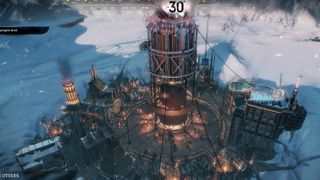
Once every twelve hours in the Frostpunk demo I've managed to get my hands on, I can open the Book of Laws and issue a new decree. It's all treated very gravely—Frostpunk, from 11 bit Studios, is a tough and gritty game about building and managing a city in a hostile, frozen environment—but it's hard not to laugh a little when my first law involves soup.
I get the gravity of the situation, I really do. My small collection of citizens are starving and freezing and miserable. Resources are in short supply. My generator is barely keeping people warm, many are sick and injured, and night is falling which will bring even colder temperatures. Cooking soup—and only soup—means being able to feed more people with less food, which makes sense.
Still, it's a soup law. It's a law about soup. It's hard to take myself seriously as the leader of the last civilization, one on the brink of doom, when I'm opening a big law book, probably while surrounded by my most trusted advisers, and writing the word 'soup' in it. Maybe in capital letters. SOUP.
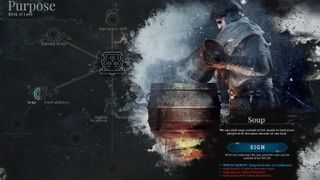
That's the first and last laugh I get in the Frostpunk demo, which gives me ten days of in-game time to play. Those are ten incredibly stressful, horrible days full of tough choices and tougher laws. Much tougher than my Law Of Only Soup.
I begin with just a generator and a few dozen cold, hungry survivors. I assign some to collecting coal, wood, and steel from the crater my city sits in, and watch as my tiny workers push their way through chest-high snowdrifts. They all leave grooves in the snow behind them, which fill back in when more snow falls. It's a really nice touch and makes me wish the zoom could push in all the way. I want to see my miserable, soup-sucking civilians up close as they shoulder their way through the frost.
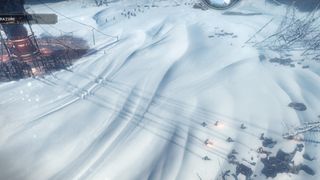
With some resources gathered I can turn on the generator for warmth (the snow around it melts away, another lovely detail) and begin to build the handful of structures available, which will crowd in a circle around my massive generator. At first there are just tents and a shelter, a hunting lodge and cookhouse, but more are added as I slowly progress through the first few days. If I keep the city together through its shaky first week I'll be able to add a building for tech research, a medical building, sawmills for harvesting trees, a coal mine, and other structures.
Aside from shelters, buildings need to be staffed with workers who are pulled from gathering duty, which means fewer resources. All the while, there are two meters at the bottom of the screen: discontent and hope. They fill and empty depending on the current circumstances and my decisions. One of those meters, like the bellies of my citizens, is always just about empty.
The biggest gaming news, reviews and hardware deals
Keep up to date with the most important stories and the best deals, as picked by the PC Gamer team.
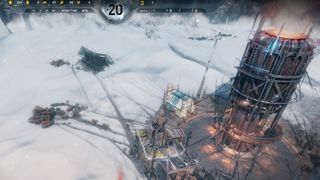
I regularly get to open my Book of Laws and make a decision, like about how to care for the ill, how to dispose of the dead (build a cemetery or just dump 'em in the snow), and whether or not children should be given jobs. Well, forced into jobs. Safe jobs! But still, jobs.
I do have one bright moment amid the grim and cold days. When I finish researching scouting, a balloon slowly lifts from the city which I can use to examine the surrounding map. It's small beacon of hope (for me, at least, as I'm too busy watching the balloon to notice if it lifts the spirits of my citizens as well). Having spied a few new locations in the world from the balloon, I can send small scouting parties out.
This results in more decisions. First, which workforce do I draw from to create my scouts in the first place? Every person I reassign from a task leaves me short-handed. My scouts, once I've assigned and dispatched them, find other survivors on the map, who I need for my labor pool but who will also deplete my meager soup reserves and take up space in the shelters. I also have to choose if I should have my scouts accompany them back (thus costing my scouts some valuable time) or hope the survivors can find my city on their own (thus risking some of them dying along the way). Every choice has a downside.
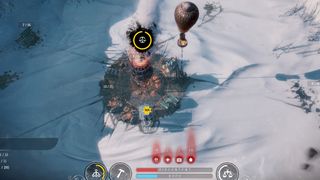
As my city slowly grows, more decisions crop up. Should I enact a law that says I can force people to work at night during an emergency? Yes, definitely, though mainly because I'm frustrated when the work stops at night anyway, especially when my latest tech research is 94% complete. I know, you're all tired and cold and hungry, but things need doing and the longer things take to do the more of you will die and the even longer things will take. To do. So do 'em.
I find that forcing children into labor is a pretty easy decision.
I find that forcing children into labor is a pretty easy decision. This comes after noticing that one kid's status is that he is on his way to play. Play? In a frozen city of death? Trust me, kid, you can make a game out of gathering rusty, jagged steel from a snowbank. It'll be fun! A little later, I'm asked to decide if kids should perform more dangerous jobs. Um... yes, but let's not issue a press release on this one, fellas. I'm beginning to feel like a pretty terrible person.
I've already had to pull staff from the medical building to gather more coal, and this is with my sick numbering so high I've run out of beds and they're lying on the floors. I can't afford the resources for a more advanced medical building so I've told my doctors to start cutting off limbs (their patients' limbs, not their own) if it's more efficient than longer, kinder treatments.
Meanwhile, the consequences of my terrible decisions begin arriving like snowfall. The people whose legs I've been sawing off can't work, but they sure can still eat. One kid I've forced to work hurt himself, and I'm torn between giving him a day off (he is a kid, after all) or reprimanding him (look, I can't have other kids deliberately hurting themselves to get out of coal duty, right?).
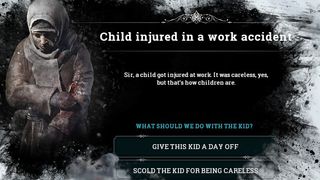
As I approach day 7 of the 10-day demo, things really begin falling apart. I haven't built enough housing for everyone and half my population is homeless. My hunters aren't gathering enough food and the cookhouse is empty. People are sick and cold and dying. Research on new tech is happening too slowly. Every person who dies means fewer resources that can be gathered, but not enough of them are dying to solve my housing shortage. I'm mulling over a decision to make cannibalism a city-sanctioned activity (should spice up the soup, at least) when I'm told my generator, which I've been running on overdrive for more warmth to combat dropping temperatures, has gone critical and needs to be repaired.
I'm told the only one who can fix it is someone small enough to crawl inside. Yes, yet another child whose life I've ruined is my city's only hope. I send her in, and she fixes the generator, dying in the process. Little Hattie Ridley, you will be remembered as a hero, because I stuffed you into a generator hatch and crossed my fingers. And then probably ate someone else's fingers.
We don't yet know Frostpunk's release date, but boy I hope it's soon. Those ten days (well, eight—my generator wound up exploding the next day anyway) were filled with challenging decisions and grim stories, and it's a gorgeous looking game to boot. The demo, as far as I know, isn't available to everyone, but if that changes I'll be sure to let you know.

Chris started playing PC games in the 1980s, started writing about them in the early 2000s, and (finally) started getting paid to write about them in the late 2000s. Following a few years as a regular freelancer, PC Gamer hired him in 2014, probably so he'd stop emailing them asking for more work. Chris has a love-hate relationship with survival games and an unhealthy fascination with the inner lives of NPCs. He's also a fan of offbeat simulation games, mods, and ignoring storylines in RPGs so he can make up his own.
Most Popular

